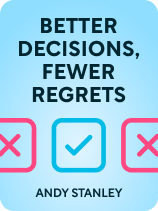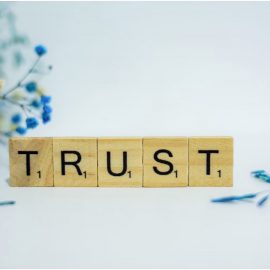

This article is an excerpt from the Shortform book guide to "Better Decisions, Fewer Regrets" by Andy Stanley. Shortform has the world's best summaries and analyses of books you should be reading.
Like this article? Sign up for a free trial here.
Why do you always make bad decisions? And how do you stop lying to yourself about your choices?
We all make bad decisions sometimes, and often it’s because we’re telling ourselves lies instead of basing our choices on reality. When we lie to ourselves, it’s easier to make unwise decisions.
Here’s how to take control of your life and make better decisions.
Why Do We Make Bad Decisions? And How Can We Make Better Ones?
You may be asking yourself, “Why do I always make bad decisions?” If so, you’re not alone. We’re good at making bad decisions—great at it, even! Why does it come so naturally to us to make choices that we’ll regret, choices that undermine how we want to spend our time and what we want to accomplish in our lives? There’s a fundamental explanation for all of this: that you make bad decisions because you’re lying to yourself. Here’s how to stop lying to yourself.
We’re Bad at Decisions Because We’re Good at Lying to Ourselves
When we make a choice, we tell ourselves a story about the situation we’re facing and the options we have in front of us. But we tend to tell ourselves stories that aren’t true, and this is the problem at the heart of our bad decisions. We often make up stories to deceive ourselves (and sometimes others, too) so that we can feel good about choosing what we feel like doing over what we should be doing. But failing to be truthful with ourselves can lead us away from good, sound, responsible decisions and toward decisions that we’ll later regret.
Most of the time, you don’t make a decision knowing that you’ll regret it later (your justification for that extra slice of pizza aside). So how can you know when you’re using a not-so-faithful interpretation of the facts to justify a decision? When you realize you’re talking yourself into something or making excuses for yourself, that often signals that you’re gearing up to make a bad decision, and using a bad story to do it. The key insight here is that we often lie to ourselves because we’re motivated to do so: Telling ourselves the truth might make us feel bad about ourselves, and fudging the truth a little makes us feel better. But that effect is temporary, and we’ll have to face the consequences of our decisions sooner or later.
| Why Are We So Good at Bending the Truth? Psychologists say that we all engage in self-deception: We lie to ourselves to avoid acknowledging truths that threaten the way we want to see ourselves. Researchers think that some of us lie to ourselves naturally, while others develop the habit to cope with challenges that come our way. While we can use these lies to block out negative thoughts, brighten our mood, or boost our self-esteem, there’s a downside too. We sometimes use self-deception to keep our consciences clear even when we behave in ways that we know are wrong. For a tragicomic illustration of how self-deception leads to regrettable decisions, just look to Wes Anderson’s 2001 film The Royal Tenenbaums. Royal, the Tenenbaum family’s estranged patriarch, habitually deceives himself to feel better about a lifetime of lying, cheating, and stealing. He even tells his family he’s dying of stomach cancer to try to bring them together again. Most of us wouldn’t go that far to save our self-image. But we do turn to self-deception to avoid the painful truth about our mistakes, or put off facing down our bad decisions. If it’s hard for Royal to let go of the lies he’s told, it’s also the only way he can start making decisions motivated by something more noble than a desire to keep his conscience clear. |
Biases and Errors in Our Thinking Make It Easy to Lie to Ourselves
Cognitive biases occur when your brain tries to make the decision-making process faster or easier and takes a shortcut that yields a less rational decision. Because your cognitive biases can keep you from thinking logically about a decision, they make it easier to choose based on how you feel right now rather than what you think might happen later. Cognitive biases make it easy for you to lie to yourself about what you should do. That reduces your chances of making a good choice, one that you’ll look back on later and be glad you made.
Because cognitive biases and other errors in your thinking are always around to influence how you think about a situation and to trip up your decision-making, you need to have a plan to get around them and make good decisions anyway. Part of that plan should be to try to see through the ways you trick yourself into making bad decisions.
(Shortform note: Many experts agree that countering your cognitive biases can help you make better decisions. Dan Gardner and Philip Tetlock write in Superforecasting that people who make accurate predictions do so in part by avoiding getting tripped up by their cognitive biases. Just being aware of these errors in thinking can help you look out for them. But the authors also note that seeking out other people’s perspectives, breaking complex problems down into simpler pieces, and challenging yourself with intellectually difficult pursuits like doing crossword puzzles or reading difficult books can help you learn to make better predictions.)

———End of Preview———
Like what you just read? Read the rest of the world's best book summary and analysis of Andy Stanley's "Better Decisions, Fewer Regrets" at Shortform.
Here's what you'll find in our full Better Decisions, Fewer Regrets summary:
- What it means to make a "good" decision
- The three most common categories of bad decisions
- How to overcome your cognitive biases to make better decisions






